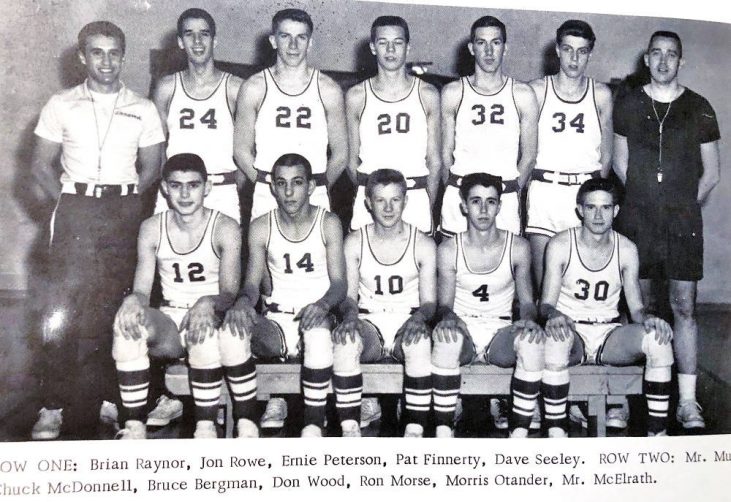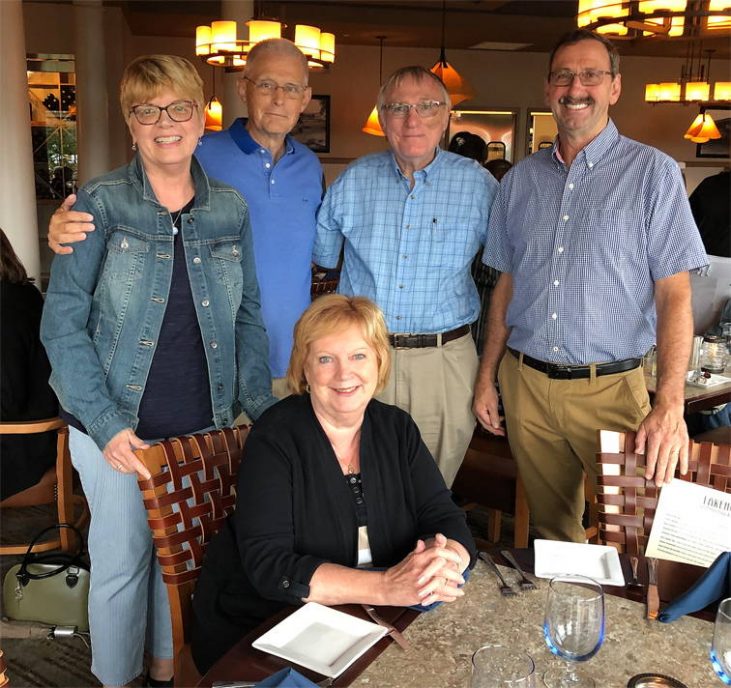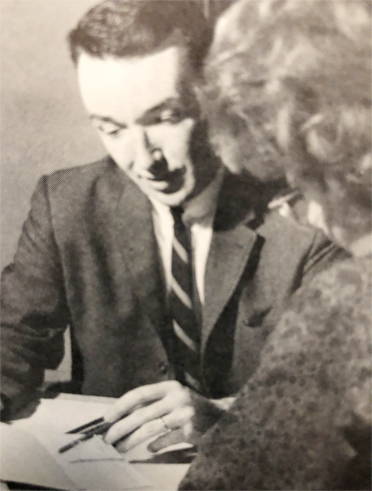The Post-Journal
by Brian Raynor
April 29, 2020
Stories To Tell

EDITOR’S NOTE: The Panama Writers Conference has been intrigued by a couple questions over the past five years, including: What draws coaches and teachers from other states to our rural areas and what becomes of them in the next steps of their teaching/coaching careers? Brian Raynor, a 1964 Panama Central School graduate and a member of the PWC, went looking for those answers. Following are three members of the Panthers’ coaching “cadre” whose stories are uniquely inspirational.
In the summer of 1957, James F. McElrath, a high school and college basketball standout with a brand-new degree in business administration from Grove City College, spoke to housing construction coworkers in nearby Clymer about returning to school to get a teaching certificate and a basketball coaching position. Word travels fast among small communities. Panama Central School principal Robert Howe drove to McElrath’s work site to interview this young man. Together they worked out a mutually advantageous position for McElrath. While completing his teaching certification, he would be employed at PCS driving a school bus, teaching junior high English, and coaching basketball. When head basketball coach Paul Owens left at mid-year to play professional baseball, “Coach” McElrath took over the program.
McElrath remained at Panama until 1966. Although he is best remembered for his tremendously successful basketball coaching career at Panama, he was also an exceptional middle school English teacher. His knowledge of diagramming and his beautiful handwriting were part of his distinctive instruction. His insistence on success was the trademark of his career at Panama in both academics and athletics.
During the eight years that McElrath coached at Panama, his teams won four Section VI championships, advanced to the sectional semifinals twice and to the sectional finals once. It wasn’t until 1978 that New York State established a state playoff system that allowed play beyond sectional championships. His emphasis on discipline, preparedness and physical conditioning led to his coaching success. During his ninth year at Panama, he gave up coaching in order to make the transition to the next phase of his career in school administration.
After completing his certification in educational administration, he became an administrator at Cassadaga Valley Central School, the principal at Jefferson Junior High, and finally the principal at Jamestown High School for 18 years. He was so highly regarded that when JHS built its new gymnasium it was named the James F. McElrath Gymnasium, more commonly and affectionately called “The Mac.”

McElrath’s students and athletes are fortunate and proud to be the beneficiaries of his illustrious professional career that was launched at Panama.
In February 1958, while playing winter baseball in Hermosillo, Sonora, Mexico, 25-year-old Arlan Barber developed bone chips in his right arm, ending his promising four-year career as a hard-hitting catcher in the Cleveland minor league baseball system. Seeking a mid-year teaching position, he contacted the placement office of his alma mater, Springfield College, where he had played in the 1955 College World Series and also where he was one of 35 players from across the country selected to play for the United States in the 1955 Pan American Games in Mexico City. Advised that there was an opening at Panama Central School, Barber was, at first, reluctant to take the position because he did not want to return to Central America where he was forced to end his playing career. After he was informed that this “Panama” was actually in Western New York, he accepted an interview for the position
Principal Robert Howe questioned Barber about his professional intentions. After all, the previous coach, Paul Owens, had just resigned his position to pursue a career in the Philadelphia Phillies baseball system. Coach Barber assured him that his injury precluded any return to professional baseball.
Thus informed, Howe hired Barber.
As the men’s physical education instructor, he introduced students to the “exotic” sports of gymnastics, boxing, wrestling, and soccer. Barber was responsible for transforming the football program from a six-man to an 11-man platform so that more students could participate. Assistant basketball coach Barber provided a calm and confident style that complemented the fiery intensity of McElrath, the head coach. Not surprisingly, Barber brought his professional experience and passion to the baseball program where his teams were constantly playoff contenders.

Barber remained at Panama until 1962, proving many times over that professional baseball’s loss was Panama’s gain. Having promised himself that he would obtain a master’s degree by the age of 30, Barber left Panama and obtained a master’s degree in 1963 from Michigan State where he was also the freshman baseball coach.
Barber received word of an open position at the University of Massachusetts from his former high school teammate and lifelong friend, Dick Berquist, the head baseball coach at UMass. Over the next 25 years, he held positions as the director of student teaching in physical education, the department chairman of physical education, the academic coordinator for athletics and coordinator of summer camps. He continued to coach baseball as an assistant to Berquist, taking UMass to its only appearance in the College World Series in 1969.
Even though he retired to Vermont, Barber couldn’t contain his passion for teaching and coaching. Learning that a local school needed a junior high baseball coach, Barber came out of retirement to coach the junior high baseball team for three years. He then followed those players, becoming the varsity team coach for three years during which time his team won the Vermont State Division III championship twice.
Barber’s calm demeanor and quiet passion for teaching and coaching are qualities that are the memorable hallmarks of his educational career that we can proudly say had its inception at Panama.
By the time John Binder arrived at Panama in the summer of 1959 to interview for his first teaching position, he had served in the U.S. Army in Korea, attended West Point, graduated from Duquesne and received a master’s degree from Notre Dame. He and his wife were searching for a home that was between his home in Pennsylvania and hers in Ohio. Although he had already accepted a teaching position in Holland, New York, when Principal Gerald Hall introduced him to the president of the school board, J. Marion Pardee, he was so impressed with Pardee and the area that he changed his mind and decided to teach in Panama. He signed a contract for $5,200 which included a $200 stipend to coach the track team.

Binder taught English and civics before becoming Panama’s first full-time guidance counselor, a position he held for three years. Using his experiences as a member of West Point’s cross country team and passion for athletic success, Binder led his track teams to two Section VI championships, a feat that that had never before been accomplished.
Seeking more opportunities for graduate work, Binder left Panama in the summer of 1964 to become a guidance counselor in Lorain, Ohio while simultaneously taking a part-time position at the Kent State University branch in Elyria. Binder earned his PhD in higher education administration from Kent State in 1972. After seven years at the Elyria campus, Binder moved to the main campus at Kent where he held the position of university ombudsman for 13 years and then completed his tenure at Kent State as associate dean of student affairs.
For more than 30 years throughout his educational career, Binder was a member of the U.S. Army reserves, rising to the rank of full colonel and becoming the commanding officer of a psychological operations unit.
Panama Central is proud to be the first beneficiary of the educational career of such an accomplished teacher, coach, counselor, advisor, administrator and patriot.
We suggest that in this time of social distancing that you take the time to apply technology to reconnect with coaches, teachers, and administrators that may have been influential to you. We think you’ll be glad you did.
The additional financial assistance of the community is critical to the success of the Chautauqua Sports Hall of Fame.
We gratefully acknowledge these individuals and organizations for their generous support.











